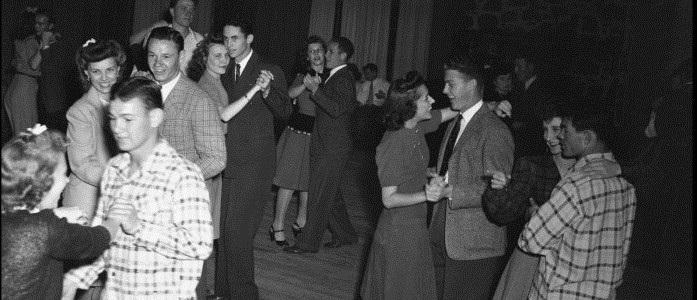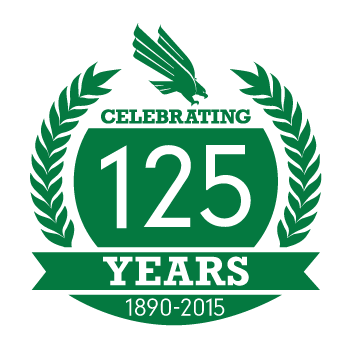The University of North Texas has been home to a rich and vibrant Greek community since 1952. Currently, UNT supports over 40 fraternities and sororities under four councils; organization members have made a significant impact in areas such as community service and academic excellence. But even before 1952, UNT students organized and gathered in various social and academic clubs and societies, usually segregated by sex.
At the turn of the 20th century, an energetic group of students gathered in the chapel to organize the school’s first society. Due to an inability to agree on the proposed constitution, the school’s first society quickly split into two separate groups: the Kendall-Bruce Literacy Society (known affectionately as the K-B), and the McKinley Society. After a few name changes and a trial co-ed integration, the McKinley society disbanded. In 1902 a rival literary society formed; the Reagan Literary Society regularly engaged in debate functions against the K-B, and the two rival groups met for a joint session in 1907 to form the Oratorical Association of the North Texas State Normal. Female students weren’t excluded from these activities for long, and the Mary Arden Club was founded in 1902. Originally created as a literary club for women and devoted to the study of Shakespeare, the club also provided its members various training opportunities in club work and social activities. In 1922 the members raised enough money through pledges to build the Mary Arden Lodge, described as being “ideally located just east of the library.” The Mary Arden club remained active until 1970, regularly hosting various teas, socials, and literary lectures on campus. The UNT Special Collections Department houses their organizational archive.
During the institution’s period as a teachers college (1923-1949), membership in men’s literary societies dwindled, but were quickly replaced by social organizations. The first group to claim the name “Talons” formed in 1927, a social club that advertised themselves as a “college spirit” group; their mission was to “bring about a closer fellowship among the boys, to arouse a stronger college spirit, and to support all college activities.” These early Talons coined the slogan “More Pep on Fewer Acres,” and in addition to attending all home athletic events (and one away game per season), the group hosted annual jubilee programs and sponsored freshman students in a little brother program.
The official student spirit organization we know as the Talons today wasn’t formed until the summer of 1960. Their goal was to foster school pride and tradition by practice and organization. The group’s first members were charged with the care and transportation of Scrappy, the North Texas Mascot, who lived at the Fort Worth zoo but visited campus for football games and the now-annual bonfire. This early Talons club was followed by the creation of the Geezles and Pi Phi Pi in 1930. One of the most important events held by the Geezles was their annual banquet, noted in 1930 as being the “only occasion where girls are present at a Geezles affair.” Rumor has it there was little love between the various male-only social groups. In the 1931 Yucca, a tongue-in-cheek version the Talon’s Constitution instructs that “no Talon shall go with another Talon’s girl … pick on the Geezles’ and the Pi Phi’s,” and “a Talon may associate with the Geezles at his own risk.”
The Geezles are no longer an active social club on campus, having disbanded in 1970, but past members still meet, boasting an active roster of past coaches, professional athletes, UNT regents, and other prominent Denton community leaders. In 2012, those alumni raised over $200,000 to install “Spiriki,” the large bronze eagle bust that sits in the player’s entrance to UNT’s new Apogee stadium. The group also supports an endowed scholarship in their name.
The University of North Texas owes much to these early social groups. You can find out more about their contributions by looking through the UNT Yearbook Collection and other items form the University Archive digitized on the Portal to Texas History!
— by Courtney Jacobs





Leave a Reply